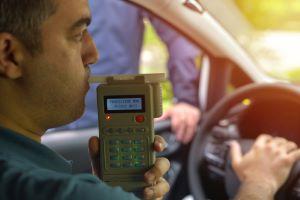If I Am Pulled Over In Texas, Do I Have to Submit to a Breathalyzer Test?
 When a police officer pulls someone over, they will often be looking to determine whether the driver is under the influence of alcohol or drugs. If an officer suspects that you are driving while intoxicated (DWI), he or she may ask you to submit to a few tests to determine your level of intoxication. But as a Texas driver, are you required to submit to such testing?
When a police officer pulls someone over, they will often be looking to determine whether the driver is under the influence of alcohol or drugs. If an officer suspects that you are driving while intoxicated (DWI), he or she may ask you to submit to a few tests to determine your level of intoxication. But as a Texas driver, are you required to submit to such testing?
Types of Sobriety Tests
There are several different types of tests that police officers may ask a driver to take, including preliminary blood alcohol tests and field sobriety tests that are meant to gauge the driver’s balance, reaction time, and ability to drive safely. These tests may include:
-
Nystagmus: This is often the first field sobriety test that officers will use, since it does not require the driver to get out of the vehicle or use any devices. The officer will place a pen in between the driver’s eyes, asking him or her to follow the pen with their eyes. This measures the driver’s ability to focus and follow directions.
-
Standing on One Leg: To check your balance, the officer may ask you to stand on one leg outside of your vehicle and multitask by counting to 100. The officer will be looking at your ability to balance while also performing another task.
-
Walk and Turn: The officer may ask you to walk in a straight line, following the painted line on the side of the road. If you are incapable of walking a straight line, they may assume that you have been drinking.
-
Breath Test: An officer may ask a driver to blow into a device commonly known as a breathalyzer. This device will measure the driver’s blood alcohol concentration (BAC) to determine if they are over the legal limit.
Implied Consent
Drivers may wonder whether they may be able to avoid a DWI charge by refusing to submit to a breath test. While drivers are not required to submit to roadside testing, refusal to do so may provide an officer with probable cause to arrest them on suspicion of drunk driving. Following an arrest, Texas law requires drivers to submit to chemical BAC testing. This law is known as implied consent, and it applies to anyone with a Texas driver’s license, as well as drivers from other states. Those who refuse to submit to this testing will have their driver’s license suspended for 180 days. If a driver is convicted of DWI, they will face additional criminal penalties, including fines, jail time, and longer periods of driver’s license suspension.
Contact a Plano, TX DWI Defense Attorney
While implied consent laws exist in Texas, an officer still must meet certain criteria in order to stop you and assert that you are driving drunk--that is where we come in. It is always best to contact an experienced criminal defense attorney as soon as possible following an arrest. The Crowder Law Firm, P.C. has a wide range of defense strategies for DWI cases, and we are prepared to use them at your disposal. Our attorneys will analyze the details of your case, determine the best course of action, and fight tirelessly on your behalf. If you are facing DWI charges, contact our Collin County DWI defense lawyer at 214-544-0061 to schedule your free consultation.
Sources:
https://statutes.capitol.texas.gov/Docs/TN/htm/TN.724.htm
https://thenewswheel.com/types-of-field-sobriety-tests/
















